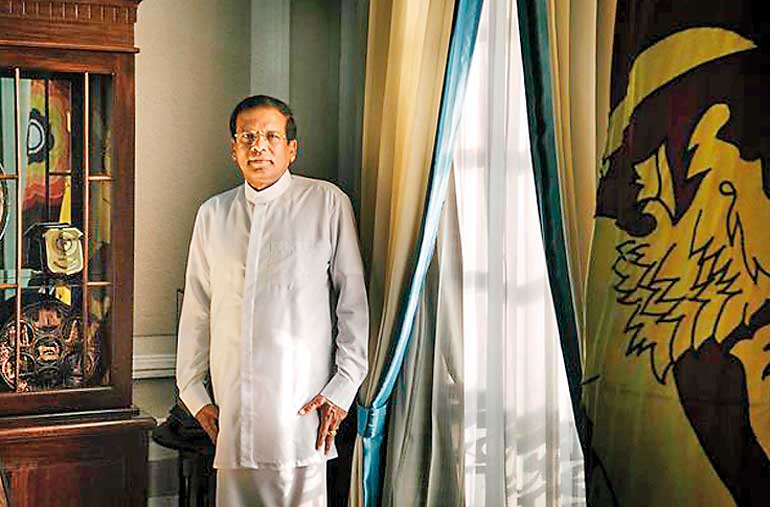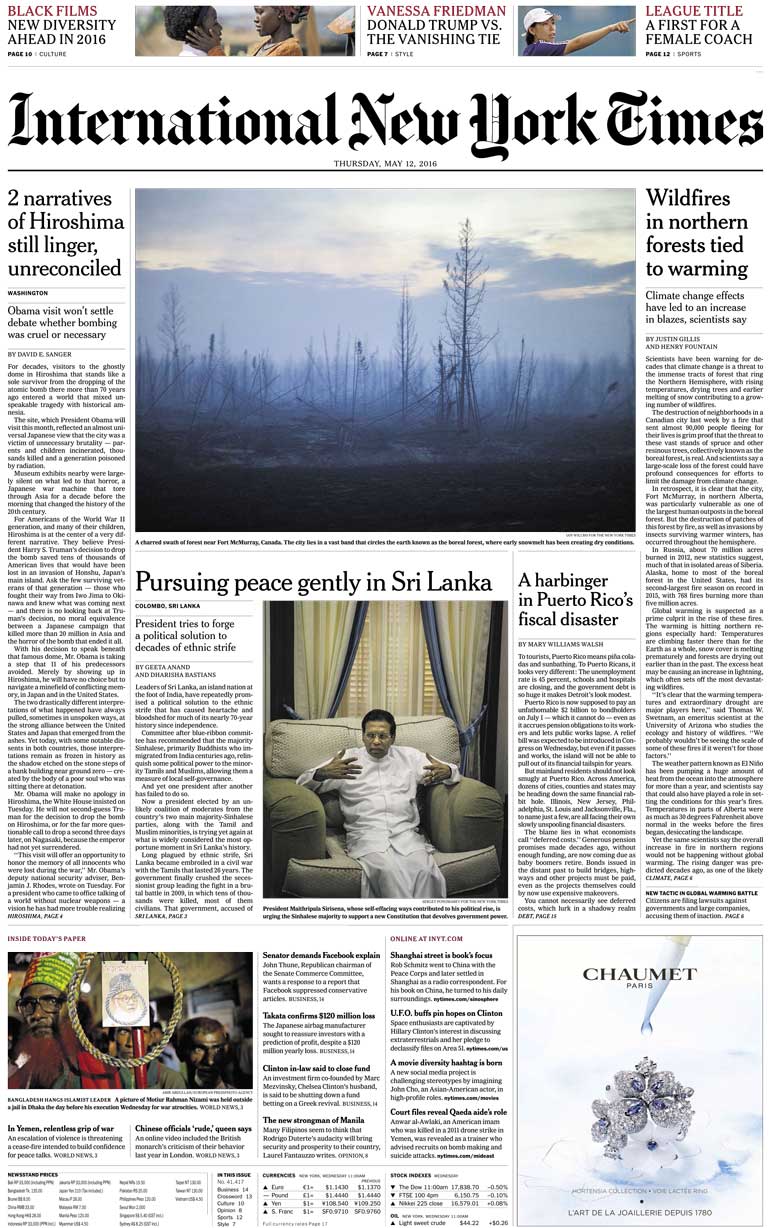Saturday Feb 21, 2026
Saturday Feb 21, 2026
Saturday, 14 May 2016 00:00 - - {{hitsCtrl.values.hits}}

President Maithripala Sirisena in his office in Colombo, the capital. He has pledged to persuade his Sinhalese people to support a new Constitution that devolves the powers of the Central Government that they dominate – Sergey Ponomarev for The New York Times
 By Geeta Anand and Dharisha Bastians
By Geeta Anand and Dharisha Bastians
The New York Times: Leaders of Sri Lanka, an island nation at the foot of India, have repeatedly promised a political solution to the ethnic strife that has caused heartache and bloodshed for much of its nearly 70-year history since independence.
Committee after blue-ribbon committee has recommended that the majority Sinhalese, primarily Buddhists who immigrated from India centuries ago, relinquish some political power to the minority Tamils and Muslims, allowing them a measure of local self-governance.
And yet one president after another has failed to do so.
Now a president elected by an unlikely coalition of moderates from the country’s two main majority-Sinhalese parties, along with the Tamil and Muslim minorities, is trying yet again at what is widely considered the most opportune moment in Sri Lanka’s history. Long plagued by ethnic strife, Sri Lanka became embroiled in a civil war with the Tamils that lasted 26 years. The Government finally crushed the secessionist group leading the fight in a brutal battle in 2009, in which tens of thousands were killed, most of them civilians. That Government, accused of human rights abuses then and in the ensuing years, was toppled by the coalition that brought Maithripala Sirisena to power in January 2015.
Chosen by the coalition because he was so agreeable and self-effacing as to have offended practically nobody, Sirisena has pledged to persuade his Sinhalese people to support a new Constitution that devolves the powers of the central government that they dominate. A referendum is expected later this year.
But questions abound about whether this 64-year-old son of a paddy farmer, who spent his political life shunning the limelight despite holding top ministerial posts, could be the one finally to lead this country into an era of peace.
“We will devolve power to the people as a whole,” Sirisena said in an interview last week. “Nobody is trying to take something away from the Sinhalese to give it to the Tamils. What we are trying to do is to give something more to everyone.”
Nobody doubts Sirisena’s sincerity, but some fear the opportunity may be slipping away.
“The ruling coalition has proven unable to generate internal consensus on key issues of public policy,” Verité Research, a Colombo think tank, said in a report last week, warning that the “moderate consensus remains deeply vulnerable”.
Sirisena, in the interview in his seaside office, where he keeps the air-conditioner off in the stifling summer heat, insisted he would not only get a Constitution adopted but also lead his country through the process of truth and reconciliation that his Government committed to undertake in a United Nations resolution last year.
The United Nations estimates that as many as 40,000 people were killed in the last phase of the civil war in 2009. Families have reported more than 5,000 people missing, making Sri Lanka the country with the second-highest number of disappearances in the world, the world body said.
“I know it is a difficult task, and I decided to accept the challenge anyway,” Sirisena said, leaning back in a white upholstered chair, himself dressed, as always, in white, from his cotton lungi skirt to his white tunic top.
“And when you take up the challenge, you mustn’t face it crying, you must smile through it,” he said, his normally serious demeanour lifted into a grin.
But Sirisena, speaking quietly and slowly, gesturing for emphasis, urged patience.
“I am not a man who rushes into things,” he said. “That is my policy.”
Sirisena came to power in a revolution at the polls early last year, when a coalition with him at the helm defeated the previous president, Mahinda Rajapaksa. Revered by some for ending the country’s civil war, Rajapaksa was reviled by others because of allegations of corruption and human rights abuses.
When coalition members were deciding whom to put forward as their candidate against Mr. Rajapaksa, they chose Sirisena “because of the very simplicity of the man,” Mangala Samaraweera, Sri Lanka’s Foreign Minister, said in an interview.
There were “more efficient, more iconic persons who may have been also able to do that job, but none of them would have been able to win the trust and confidence of so many different layers of Sri Lanka’s constituencies, the Tamils, the Muslims,” said Samaraweera, who joined Parliament in 1989, the same year as Sirisena. “I really personally believe Sirisena never ever had any ambitions” for the top job. Sirisena, who was Health Minister under Rajapaksa before defecting to join the coalition against him, had also been his party’s General Secretary for 13 years. He began his political life as a communist, and still reveres Karl Marx, with a picture of him prominently displayed in his home.
M.A. Sumanthiran, a leading constitutional lawyer and Member of Parliament from the Tamil National Alliance, said that when he was asked to support Sirisena’s candidacy, he knew him only as “a man of few words who smiles and shies away”.
But as a member of a committee appointed to advise Parliament on a new Constitution, Sumanthiran said, he was impressed at how Sirisena finessed a divisive question of ethnicity in the preamble to the new Constitution. Convinced that a new Constitution must begin its life with unanimous support in Parliament, Sirisena persuaded all sides to drop the preamble and instead support a simple resolution for a Constitution to be drafted. That garnered unanimous support.
“These are little steps compared to what we expect him to do,” Sumanthiran said, but “it’s giving us confidence in his methods”.
Sirisena, in the interview, said lobbying fellow legislators was his forte, and laughed as he described his efforts in humorous detail. In April last year, he got two-thirds of the 225-member Parliament to support a constitutional amendment reducing presidential powers, as he had pledged to do if elected.
“I went to the Parliament dining hall, sat with them and asked them to take away my powers. I put my arm around their shoulders, held them by their arms and rubbed their bellies to convince them to take away my powers,” he said, speaking softly, his shoulders rising and falling in jerks as he chuckled to himself.
Sirisena steered clear of committing to a timeline, saying, “I don’t think the drafting of a country’s constitution should be rushed. If we rush the process, the extremists could exploit that situation.”
But moving slowly has risks, too.
To maintain support within their ethnic communities, the moderates needed to demonstrate progress, said Verité, the think tank, but the results they must show are divergent.

“The change in government has renewed Tamil expectations that their immediate grievances as well as historical grievances — particularly over power sharing — will be meaningfully addressed,” Verité said in its report.
But Verité said proposals for greater power sharing and accountability for rights abuses and war crimes are likely to be strongly resisted because the Government had “made no concerted effort” to shift Sinhala opinion “in favour of a more equitable power-sharing arrangement”.
Making it harder, Rajapaksa retains sway over a big portion of Sirisena’s political party, and at every opportunity loudly denounces him as selling out his own people.
That appears to have persuaded the Government to back away from a resolution it co-sponsored at the United Nations in September to involve foreign judges in a special court to investigate and prosecute human rights abuses.
“The President is reflecting a kind of general view amongst the public about not having foreign judges,” said Samaraweera, the Foreign Minister. The Tamil population, sceptical of a process led by the Central Government, had insisted on the involvement of foreign judges, and this apparent backtracking has worried some.
“Sirisena’s attitude is to try to be deft instead of bold,” said Paikiasothy Saravanamuttu, Executive Director of the Center for Policy Alternatives, a Colombo research and advocacy group. “We’re waiting for him to play the fullest possible role.”
Samaraweera said Government leaders plan a major effort to build support in the coming months. The first step would be to raise awareness among the Sinhalese about what really happened in the civil war, something they have been largely shielded from.
“The Sinhalese, once they know the truth, are a pretty compassionate bunch of people,” he said, predicting they will come to support the process. Sirisena said he, too, remained convinced that his Sinhalese majority would support a new Constitution.
“For the Sinhalese people to live happily in this country,” he said, repeating a line he has used often in speeches, “the minority communities also must be happy”.